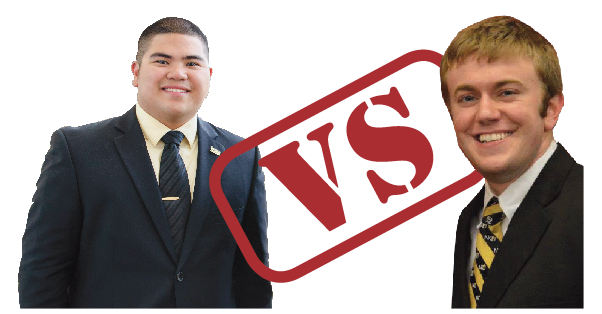SGA Election 2014: Battle continues as Judicial Council hears arguments regarding grievance
Accusations of libel and voter intimidation were the main details released today as a part of the grievance filed by Student Government Association presidential and vice presidential candidates David Trump and Justin Wynne, regarding the recent 2014 election.
The details were announced during a formal meeting ran by SGA’s Judicial Council.
The grievance, aimed against now president and vice president-elects John Jose and Kat Hahnel, included accusations of libel through a pictorial posted on Jose and Hahnel’s Facebook campaign page and accusations of voter intimidation via messages from former Secretary of Student Involvement Tina Hoesl.
Jose was present at the meeting and was represented by SGA senator Patrick Reagan. Hahnel did not attend.
Both Trump and Wynne did not attend today’s meetings, but were represented by witness to the grievance, and also SGA senator, Chandler Taylor.
Libel
The libelous material in question, as illustrated in the grievance, was a pictorial that was briefly released on Jose and Hahnel’s Facebook page comparing SGA President Erik Pederson to George Bush and Trump to Dick Cheney.
The use of #dumpthetrump in Jose and Hahnel’s post was also labeled as libelous, according to the grievance.
Reagan argued for Jose and Hahnel that comparing Trump to Cheney was not libel.
“Comparing him [Trump] to vice president Cheney is not defaming his character, in fact it could have made some people more likely to vote for him depending upon how you swing politically,” Reagan said.
Reagan added that the post was made at 10 a.m. on March 24, by a member of Jose and Hahnel’s campaign team, without prior authorization from Jose. The post was taken down within a half hour, as soon as Jose found out about it, according to Reagan.
Additionally, Reagan said that Trump and Wynne would have had plenty of time to file a grievance about the post before the election even occurred, rather than waiting until after their two-vote loss.
Arguments were also made by Reagan that the use of #dumpthetrump was not libelous.
“While it is a negative campaign tactic, that myself and John do not approve of, it is not libel,” Reagan said.
Libel is defined as a statement that defames a person’s character in a malicious way, as stated in the meeting.
Reagan argued that Trump has always had and still has a great reputation on campus, regardless of the post.
Taylor defended the grievance and argued that the post and its associated antics degraded Trump’s reputation.
Voter intimidation
The voter intimidation in question was pointed at Hoesl, who was allegedly supporting Jose and Hahnel’s campaign.
The grievance argued that Hoesl sent intimidating emails to students, demanding them to vote for Jose and Hahnel in the election. Email messages are not allowed according to SGA’s official election policies, so this would be an infraction of those policies.
However, the “intimidating emails” in question turned out to actually be Facebook messages sent from Hoesl’s personal Facebook page. SGA official election policies state that Facebook is not included in the ban on emails.
The Judicial Council and participating members of the meeting spent a lot of time arguing over what a Facebook message is, versus an email.
The content of the “emails,” which was called “intimidating,” was also read and included words such as “please” and “thank you.” Reagan argued that please and thank you are not what most college students would consider words of intimidation that would cause voter suppression.
The last point of the grievance accused Hoesl of intimidating students in person, saying she “yelled” at and “threatened” student Hannah Jones and used her former position as Delta Gamma president to take “power” over her sorority sisters.
Taylor argued overall that these things came together to create a sense of voter suppression in this year’s elections, which led to the grievance being filed in the first place.
“The problem that I have with everything that has gone on, is that there have been students who have come up to me and told me that they did not vote because of the way that they felt,” Taylor said. “When it comes down to two people who could change the election, that is the biggest problem that I had.”
Conclusions
The Judicial Council met in private to deliberate on their findings after the open meeting.
The results of their deliberation must be publicly announced within three business days of the meeting.
President-elect Jose commented after the meeting, saying he was ready to just move on and felt this entire process was “gruesome.”
“We just want to get stuff done and get to working on things,” Jose said. “I just hope this doesn’t take the full three days.”
Pederson stayed throughout the entire meeting and seemed pleased at the dialogue that was occurring.
“This is how I think all student issues should be handled,” he said.
Trump could not be reached for comment by The Northerner at the time of this publication.
Continue to check back to TheNortherner.com for updates on this story and more.


